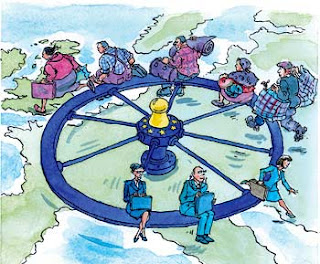
The nuclear issue in the
Middle East will remain problematic for all parties involved in it.
What is common about
Israel and
Iran is that both are secretive about how much they have preceded in their nuclear programs.
Israel remains reluctant to reveal to the world its
nuclear program and how much nuclear arms it has, refusing international inspection.
Iran on its part remains defiant about its own
nuclear program, whether, as it says, it is
for peaceful purposes or as a deterrent against attacks. It is up to now portrayed as a danger by nuclear powers
USA,
UK and
Israel.
Israel and Iran will remain the source of danger in the Middle East. Israel apparently has the backing of the international community to defend its sovereignty and to continue existing. Iran, if it happens to acquire nuclear weapons, will be a real force in the Middle East. It will be the voice of anti-American activists and their followers. It will also have the power of religion as an instrument for influence , as there are over a billion Muslims, many of whom will be ready to take Iran’s side in its struggle against its giant opponents who can encircle it militarily and economically.
While Israel will seek political, military and economic support from its allies, Iran will find public support in Muslim countries as its asset to offset or stand possible attacks. Not forgetting its use of oil as another form of weapons affecting production in the whole region and its consequence on the world economy. This kind of queer balance of power between these antagonists can create another twisting situation in the middle East far worse than 1973 Israeli-Arab War, the Gulf War between Iraq and Iran in the 80s and finally the current USA invasion of Iraq.
Israel and Iran will continue to be sworn enemies. Israel’s happiest day will the downfall of the current Iranian regime. Iranian President Ahmadinejad’s cherished dream is the disappearance of the state of Israel from the face of the earth. However, both will continue to exist as state and regime without agreeing to live and let live, at least in the foreseeable future. Maybe such political contention is their political sport as each tries to score political points on the other, creating excitement among their fellow politicians around the world about where their political divisions may lead them, with the US, the big boss, fanning the heat between them from time to time.
The wishful thinking remains that one day the Middle East becomes united states where religion and race are no longer used as a pretext to seek one another’s destruction. The politicians should no longer refer to the past to unearth each other felonies. The apocalypses awaiting this region, if the worst comes to the worst, should be just a material for fictional movies like the Day After. Politicians shouldn’t be impatient to see their enemies under their feet just to settle personal counts, disregarding the wish of the public, however politically inept they may appear, to live in peace.
May be such wishful thinking is laughable as the situation in this region is far too complex by resolving it on the ground of compassion and mutual acceptance. It is as complex as carrying a nuclear test for someone who can’t make difference between a nuclear head and a biological one.































